Network Security Report: A Comprehensive Study of Trojan Attacks
VerifiedAdded on 2020/05/11
|15
|2806
|80
Report
AI Summary
This report provides a comprehensive overview of Trojan attacks in network security. It begins with an introduction to the topic and a discussion of the threats posed by Trojans. The report then delves into the latest Trojan attacks, including Backdoor, Downloader, Remote Access (RAT), DDoS, and Infostealer Trojans, detailing their functionalities and the types of damage they inflict. Furthermore, it identifies the most vulnerable platforms to these attacks, such as MS-DOS and Windows. The report concludes by presenting various prevention techniques, including the use of anti-virus software, avoiding floppy disk startups, monitoring downloaded programs, refraining from opening unknown email attachments, and regularly backing up system files. The information is aimed at both computer users and developers to mitigate the impact of Trojan attacks.
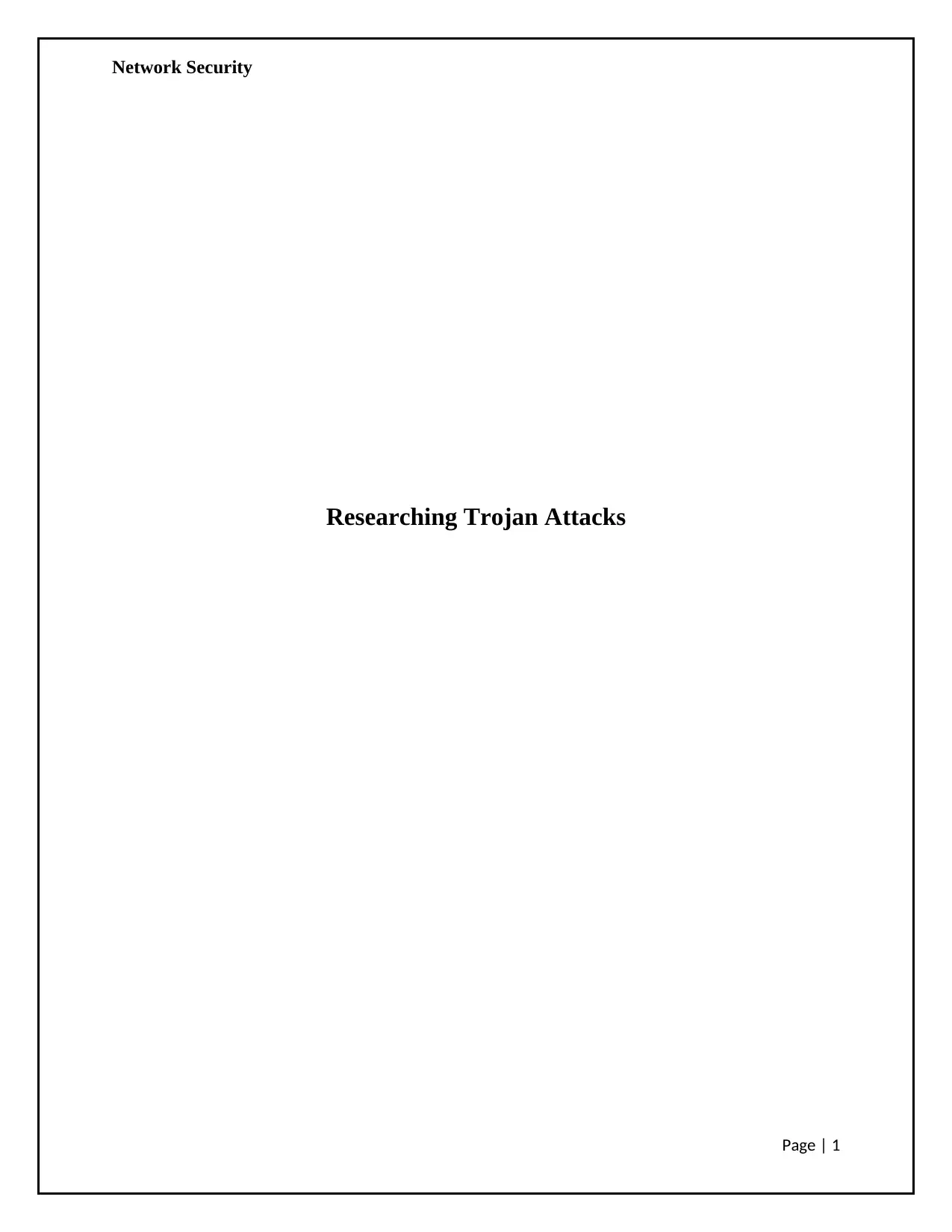
Network Security
Researching Trojan Attacks
Page | 1
Researching Trojan Attacks
Page | 1
Paraphrase This Document
Need a fresh take? Get an instant paraphrase of this document with our AI Paraphraser
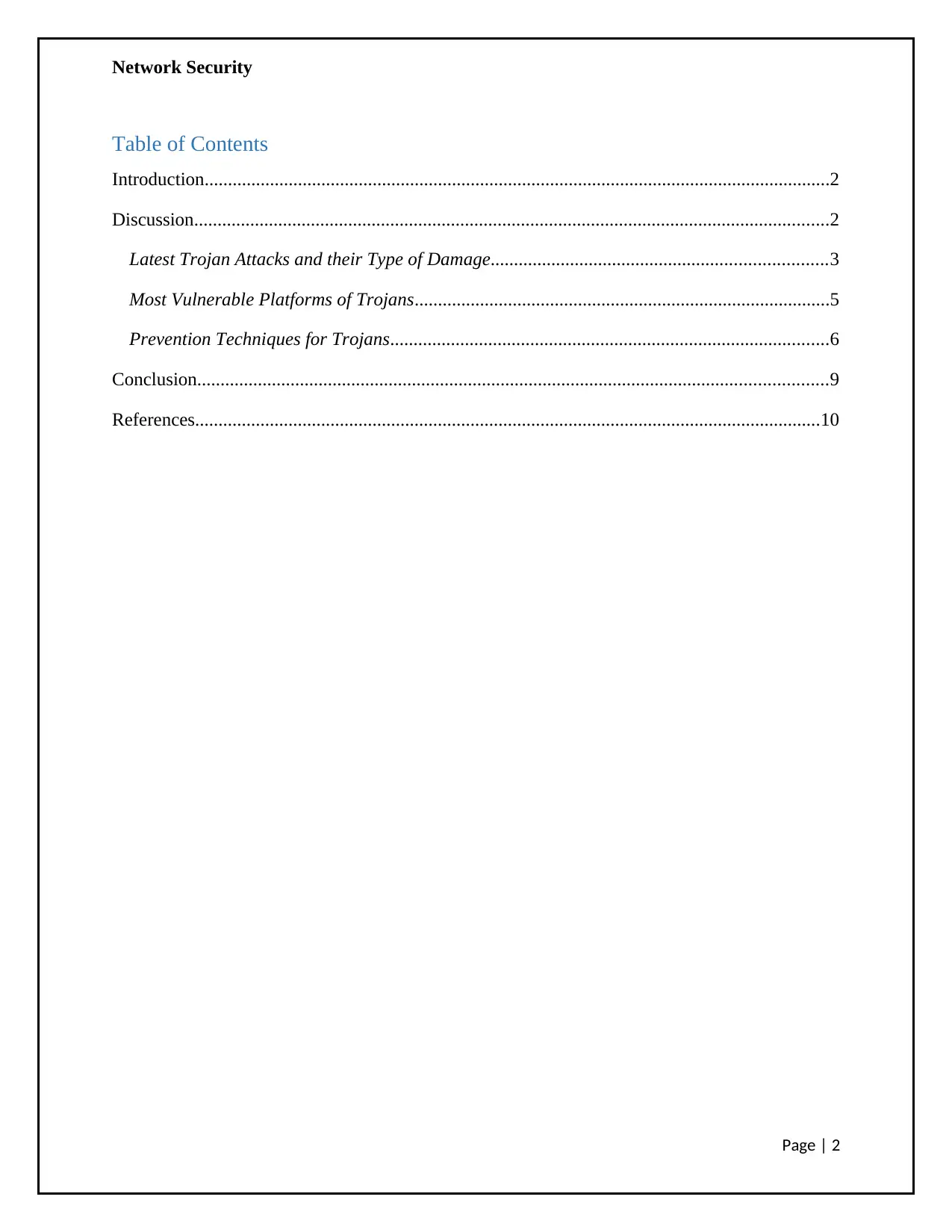
Network Security
Table of Contents
Introduction......................................................................................................................................2
Discussion........................................................................................................................................2
Latest Trojan Attacks and their Type of Damage........................................................................3
Most Vulnerable Platforms of Trojans.........................................................................................5
Prevention Techniques for Trojans..............................................................................................6
Conclusion.......................................................................................................................................9
References......................................................................................................................................10
Page | 2
Table of Contents
Introduction......................................................................................................................................2
Discussion........................................................................................................................................2
Latest Trojan Attacks and their Type of Damage........................................................................3
Most Vulnerable Platforms of Trojans.........................................................................................5
Prevention Techniques for Trojans..............................................................................................6
Conclusion.......................................................................................................................................9
References......................................................................................................................................10
Page | 2
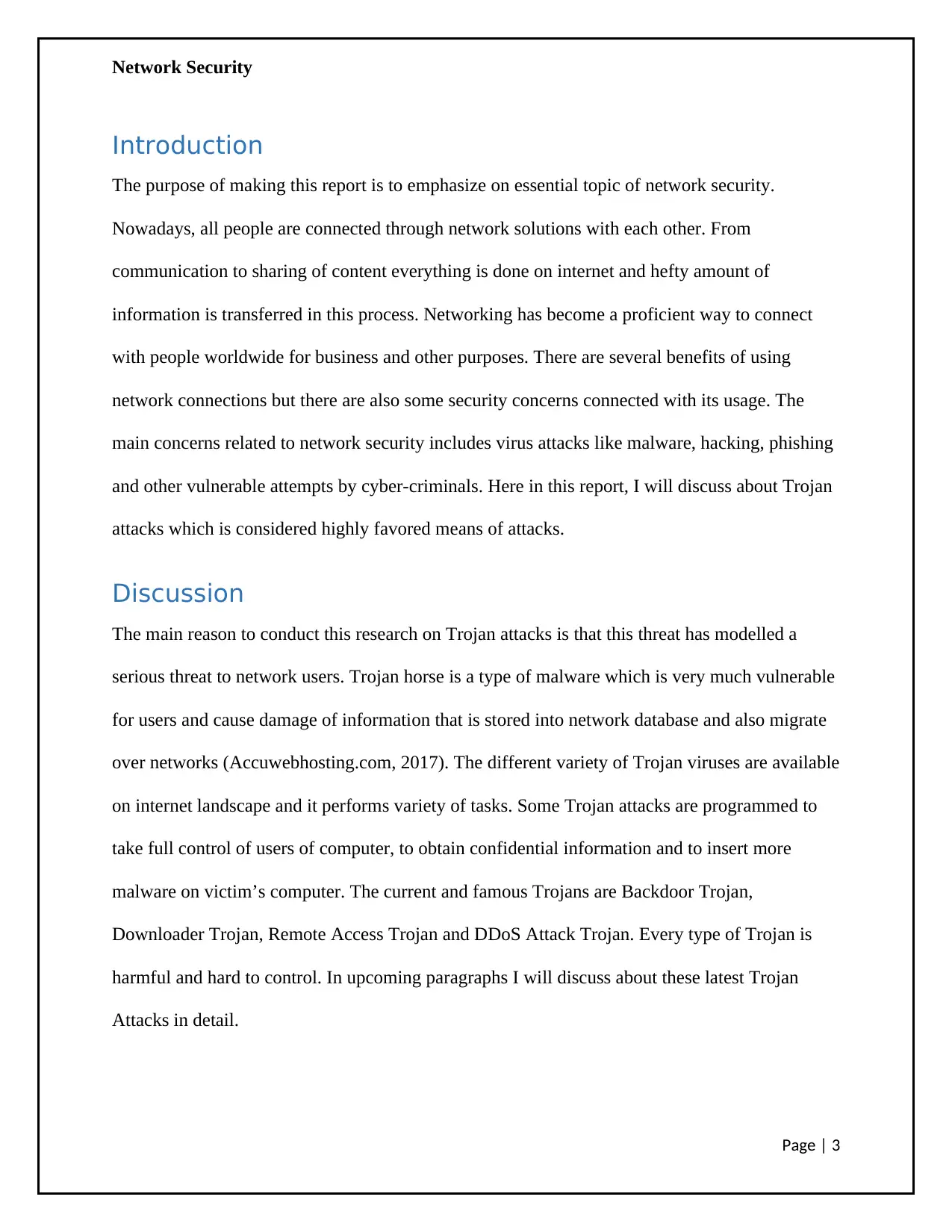
Network Security
Introduction
The purpose of making this report is to emphasize on essential topic of network security.
Nowadays, all people are connected through network solutions with each other. From
communication to sharing of content everything is done on internet and hefty amount of
information is transferred in this process. Networking has become a proficient way to connect
with people worldwide for business and other purposes. There are several benefits of using
network connections but there are also some security concerns connected with its usage. The
main concerns related to network security includes virus attacks like malware, hacking, phishing
and other vulnerable attempts by cyber-criminals. Here in this report, I will discuss about Trojan
attacks which is considered highly favored means of attacks.
Discussion
The main reason to conduct this research on Trojan attacks is that this threat has modelled a
serious threat to network users. Trojan horse is a type of malware which is very much vulnerable
for users and cause damage of information that is stored into network database and also migrate
over networks (Accuwebhosting.com, 2017). The different variety of Trojan viruses are available
on internet landscape and it performs variety of tasks. Some Trojan attacks are programmed to
take full control of users of computer, to obtain confidential information and to insert more
malware on victim’s computer. The current and famous Trojans are Backdoor Trojan,
Downloader Trojan, Remote Access Trojan and DDoS Attack Trojan. Every type of Trojan is
harmful and hard to control. In upcoming paragraphs I will discuss about these latest Trojan
Attacks in detail.
Page | 3
Introduction
The purpose of making this report is to emphasize on essential topic of network security.
Nowadays, all people are connected through network solutions with each other. From
communication to sharing of content everything is done on internet and hefty amount of
information is transferred in this process. Networking has become a proficient way to connect
with people worldwide for business and other purposes. There are several benefits of using
network connections but there are also some security concerns connected with its usage. The
main concerns related to network security includes virus attacks like malware, hacking, phishing
and other vulnerable attempts by cyber-criminals. Here in this report, I will discuss about Trojan
attacks which is considered highly favored means of attacks.
Discussion
The main reason to conduct this research on Trojan attacks is that this threat has modelled a
serious threat to network users. Trojan horse is a type of malware which is very much vulnerable
for users and cause damage of information that is stored into network database and also migrate
over networks (Accuwebhosting.com, 2017). The different variety of Trojan viruses are available
on internet landscape and it performs variety of tasks. Some Trojan attacks are programmed to
take full control of users of computer, to obtain confidential information and to insert more
malware on victim’s computer. The current and famous Trojans are Backdoor Trojan,
Downloader Trojan, Remote Access Trojan and DDoS Attack Trojan. Every type of Trojan is
harmful and hard to control. In upcoming paragraphs I will discuss about these latest Trojan
Attacks in detail.
Page | 3
⊘ This is a preview!⊘
Do you want full access?
Subscribe today to unlock all pages.

Trusted by 1+ million students worldwide
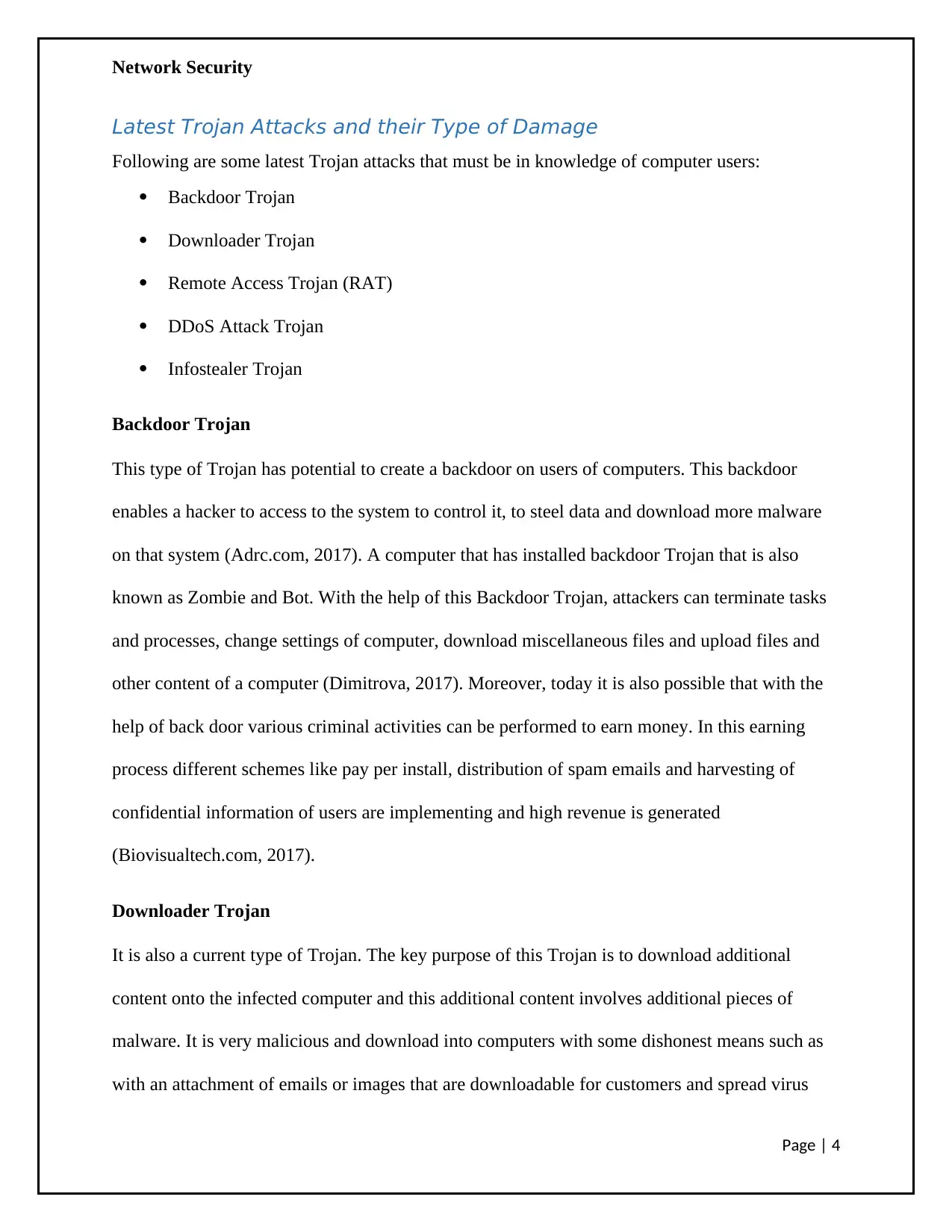
Network Security
Latest Trojan Attacks and their Type of Damage
Following are some latest Trojan attacks that must be in knowledge of computer users:
Backdoor Trojan
Downloader Trojan
Remote Access Trojan (RAT)
DDoS Attack Trojan
Infostealer Trojan
Backdoor Trojan
This type of Trojan has potential to create a backdoor on users of computers. This backdoor
enables a hacker to access to the system to control it, to steel data and download more malware
on that system (Adrc.com, 2017). A computer that has installed backdoor Trojan that is also
known as Zombie and Bot. With the help of this Backdoor Trojan, attackers can terminate tasks
and processes, change settings of computer, download miscellaneous files and upload files and
other content of a computer (Dimitrova, 2017). Moreover, today it is also possible that with the
help of back door various criminal activities can be performed to earn money. In this earning
process different schemes like pay per install, distribution of spam emails and harvesting of
confidential information of users are implementing and high revenue is generated
(Biovisualtech.com, 2017).
Downloader Trojan
It is also a current type of Trojan. The key purpose of this Trojan is to download additional
content onto the infected computer and this additional content involves additional pieces of
malware. It is very malicious and download into computers with some dishonest means such as
with an attachment of emails or images that are downloadable for customers and spread virus
Page | 4
Latest Trojan Attacks and their Type of Damage
Following are some latest Trojan attacks that must be in knowledge of computer users:
Backdoor Trojan
Downloader Trojan
Remote Access Trojan (RAT)
DDoS Attack Trojan
Infostealer Trojan
Backdoor Trojan
This type of Trojan has potential to create a backdoor on users of computers. This backdoor
enables a hacker to access to the system to control it, to steel data and download more malware
on that system (Adrc.com, 2017). A computer that has installed backdoor Trojan that is also
known as Zombie and Bot. With the help of this Backdoor Trojan, attackers can terminate tasks
and processes, change settings of computer, download miscellaneous files and upload files and
other content of a computer (Dimitrova, 2017). Moreover, today it is also possible that with the
help of back door various criminal activities can be performed to earn money. In this earning
process different schemes like pay per install, distribution of spam emails and harvesting of
confidential information of users are implementing and high revenue is generated
(Biovisualtech.com, 2017).
Downloader Trojan
It is also a current type of Trojan. The key purpose of this Trojan is to download additional
content onto the infected computer and this additional content involves additional pieces of
malware. It is very malicious and download into computers with some dishonest means such as
with an attachment of emails or images that are downloadable for customers and spread virus
Page | 4
Paraphrase This Document
Need a fresh take? Get an instant paraphrase of this document with our AI Paraphraser
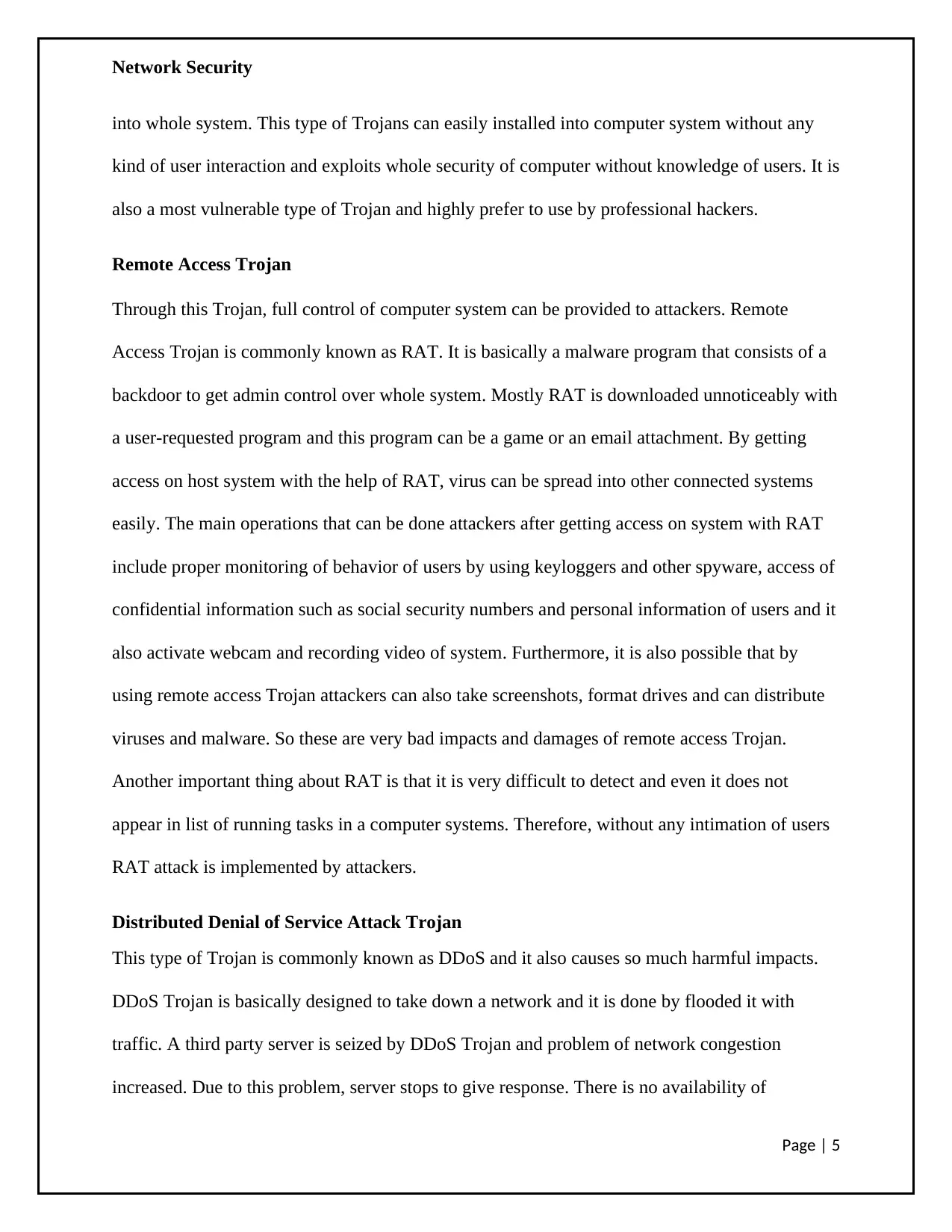
Network Security
into whole system. This type of Trojans can easily installed into computer system without any
kind of user interaction and exploits whole security of computer without knowledge of users. It is
also a most vulnerable type of Trojan and highly prefer to use by professional hackers.
Remote Access Trojan
Through this Trojan, full control of computer system can be provided to attackers. Remote
Access Trojan is commonly known as RAT. It is basically a malware program that consists of a
backdoor to get admin control over whole system. Mostly RAT is downloaded unnoticeably with
a user-requested program and this program can be a game or an email attachment. By getting
access on host system with the help of RAT, virus can be spread into other connected systems
easily. The main operations that can be done attackers after getting access on system with RAT
include proper monitoring of behavior of users by using keyloggers and other spyware, access of
confidential information such as social security numbers and personal information of users and it
also activate webcam and recording video of system. Furthermore, it is also possible that by
using remote access Trojan attackers can also take screenshots, format drives and can distribute
viruses and malware. So these are very bad impacts and damages of remote access Trojan.
Another important thing about RAT is that it is very difficult to detect and even it does not
appear in list of running tasks in a computer systems. Therefore, without any intimation of users
RAT attack is implemented by attackers.
Distributed Denial of Service Attack Trojan
This type of Trojan is commonly known as DDoS and it also causes so much harmful impacts.
DDoS Trojan is basically designed to take down a network and it is done by flooded it with
traffic. A third party server is seized by DDoS Trojan and problem of network congestion
increased. Due to this problem, server stops to give response. There is no availability of
Page | 5
into whole system. This type of Trojans can easily installed into computer system without any
kind of user interaction and exploits whole security of computer without knowledge of users. It is
also a most vulnerable type of Trojan and highly prefer to use by professional hackers.
Remote Access Trojan
Through this Trojan, full control of computer system can be provided to attackers. Remote
Access Trojan is commonly known as RAT. It is basically a malware program that consists of a
backdoor to get admin control over whole system. Mostly RAT is downloaded unnoticeably with
a user-requested program and this program can be a game or an email attachment. By getting
access on host system with the help of RAT, virus can be spread into other connected systems
easily. The main operations that can be done attackers after getting access on system with RAT
include proper monitoring of behavior of users by using keyloggers and other spyware, access of
confidential information such as social security numbers and personal information of users and it
also activate webcam and recording video of system. Furthermore, it is also possible that by
using remote access Trojan attackers can also take screenshots, format drives and can distribute
viruses and malware. So these are very bad impacts and damages of remote access Trojan.
Another important thing about RAT is that it is very difficult to detect and even it does not
appear in list of running tasks in a computer systems. Therefore, without any intimation of users
RAT attack is implemented by attackers.
Distributed Denial of Service Attack Trojan
This type of Trojan is commonly known as DDoS and it also causes so much harmful impacts.
DDoS Trojan is basically designed to take down a network and it is done by flooded it with
traffic. A third party server is seized by DDoS Trojan and problem of network congestion
increased. Due to this problem, server stops to give response. There is no availability of
Page | 5
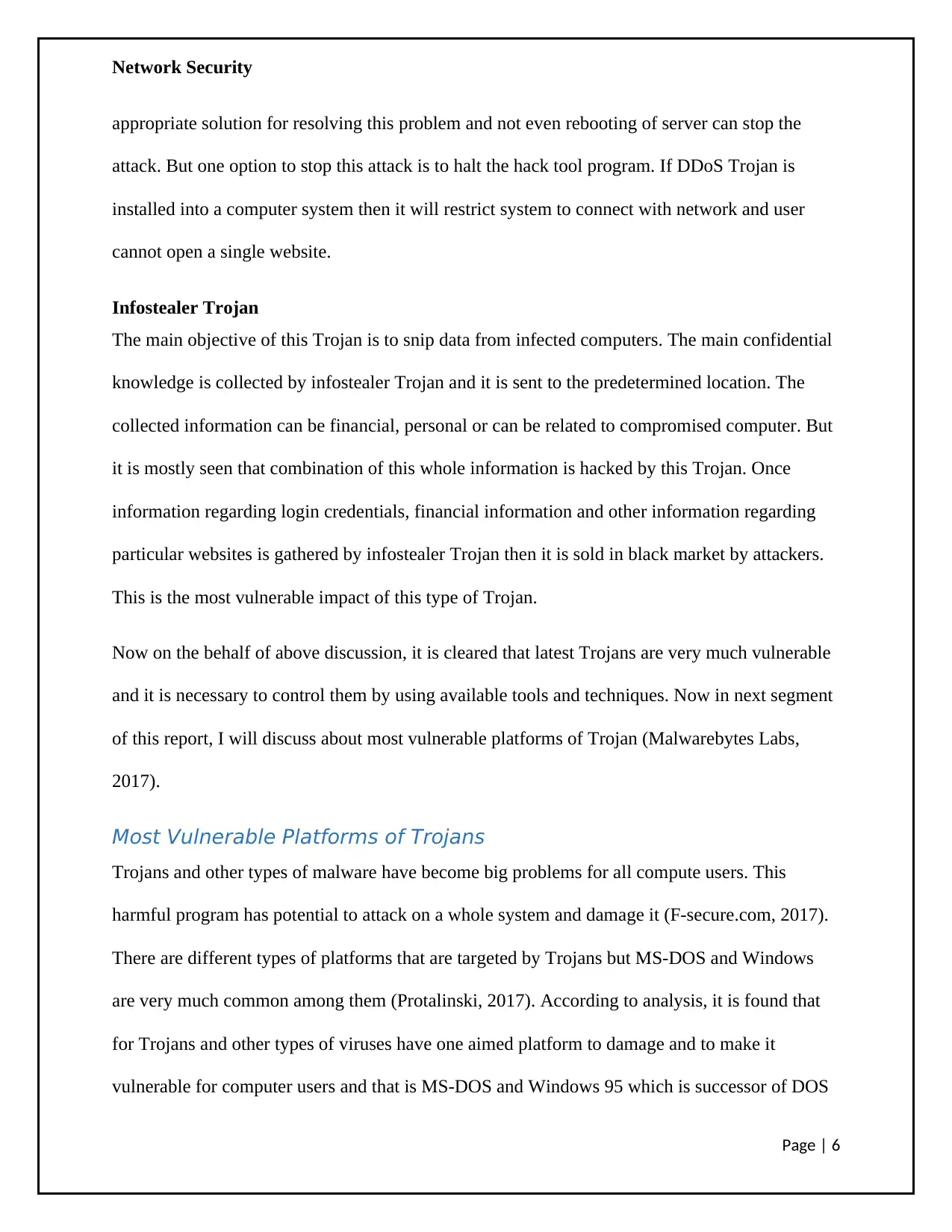
Network Security
appropriate solution for resolving this problem and not even rebooting of server can stop the
attack. But one option to stop this attack is to halt the hack tool program. If DDoS Trojan is
installed into a computer system then it will restrict system to connect with network and user
cannot open a single website.
Infostealer Trojan
The main objective of this Trojan is to snip data from infected computers. The main confidential
knowledge is collected by infostealer Trojan and it is sent to the predetermined location. The
collected information can be financial, personal or can be related to compromised computer. But
it is mostly seen that combination of this whole information is hacked by this Trojan. Once
information regarding login credentials, financial information and other information regarding
particular websites is gathered by infostealer Trojan then it is sold in black market by attackers.
This is the most vulnerable impact of this type of Trojan.
Now on the behalf of above discussion, it is cleared that latest Trojans are very much vulnerable
and it is necessary to control them by using available tools and techniques. Now in next segment
of this report, I will discuss about most vulnerable platforms of Trojan (Malwarebytes Labs,
2017).
Most Vulnerable Platforms of Trojans
Trojans and other types of malware have become big problems for all compute users. This
harmful program has potential to attack on a whole system and damage it (F-secure.com, 2017).
There are different types of platforms that are targeted by Trojans but MS-DOS and Windows
are very much common among them (Protalinski, 2017). According to analysis, it is found that
for Trojans and other types of viruses have one aimed platform to damage and to make it
vulnerable for computer users and that is MS-DOS and Windows 95 which is successor of DOS
Page | 6
appropriate solution for resolving this problem and not even rebooting of server can stop the
attack. But one option to stop this attack is to halt the hack tool program. If DDoS Trojan is
installed into a computer system then it will restrict system to connect with network and user
cannot open a single website.
Infostealer Trojan
The main objective of this Trojan is to snip data from infected computers. The main confidential
knowledge is collected by infostealer Trojan and it is sent to the predetermined location. The
collected information can be financial, personal or can be related to compromised computer. But
it is mostly seen that combination of this whole information is hacked by this Trojan. Once
information regarding login credentials, financial information and other information regarding
particular websites is gathered by infostealer Trojan then it is sold in black market by attackers.
This is the most vulnerable impact of this type of Trojan.
Now on the behalf of above discussion, it is cleared that latest Trojans are very much vulnerable
and it is necessary to control them by using available tools and techniques. Now in next segment
of this report, I will discuss about most vulnerable platforms of Trojan (Malwarebytes Labs,
2017).
Most Vulnerable Platforms of Trojans
Trojans and other types of malware have become big problems for all compute users. This
harmful program has potential to attack on a whole system and damage it (F-secure.com, 2017).
There are different types of platforms that are targeted by Trojans but MS-DOS and Windows
are very much common among them (Protalinski, 2017). According to analysis, it is found that
for Trojans and other types of viruses have one aimed platform to damage and to make it
vulnerable for computer users and that is MS-DOS and Windows 95 which is successor of DOS
Page | 6
⊘ This is a preview!⊘
Do you want full access?
Subscribe today to unlock all pages.

Trusted by 1+ million students worldwide
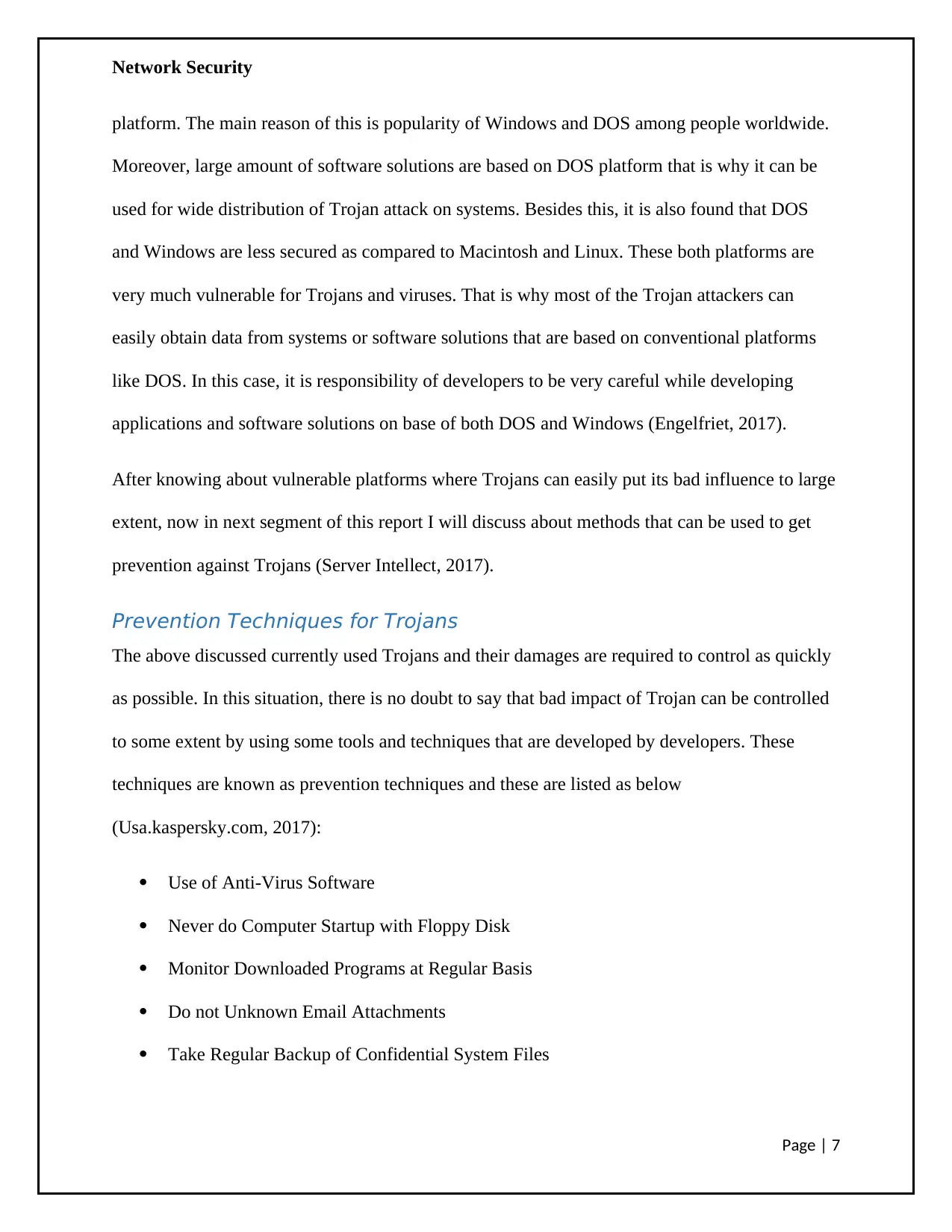
Network Security
platform. The main reason of this is popularity of Windows and DOS among people worldwide.
Moreover, large amount of software solutions are based on DOS platform that is why it can be
used for wide distribution of Trojan attack on systems. Besides this, it is also found that DOS
and Windows are less secured as compared to Macintosh and Linux. These both platforms are
very much vulnerable for Trojans and viruses. That is why most of the Trojan attackers can
easily obtain data from systems or software solutions that are based on conventional platforms
like DOS. In this case, it is responsibility of developers to be very careful while developing
applications and software solutions on base of both DOS and Windows (Engelfriet, 2017).
After knowing about vulnerable platforms where Trojans can easily put its bad influence to large
extent, now in next segment of this report I will discuss about methods that can be used to get
prevention against Trojans (Server Intellect, 2017).
Prevention Techniques for Trojans
The above discussed currently used Trojans and their damages are required to control as quickly
as possible. In this situation, there is no doubt to say that bad impact of Trojan can be controlled
to some extent by using some tools and techniques that are developed by developers. These
techniques are known as prevention techniques and these are listed as below
(Usa.kaspersky.com, 2017):
Use of Anti-Virus Software
Never do Computer Startup with Floppy Disk
Monitor Downloaded Programs at Regular Basis
Do not Unknown Email Attachments
Take Regular Backup of Confidential System Files
Page | 7
platform. The main reason of this is popularity of Windows and DOS among people worldwide.
Moreover, large amount of software solutions are based on DOS platform that is why it can be
used for wide distribution of Trojan attack on systems. Besides this, it is also found that DOS
and Windows are less secured as compared to Macintosh and Linux. These both platforms are
very much vulnerable for Trojans and viruses. That is why most of the Trojan attackers can
easily obtain data from systems or software solutions that are based on conventional platforms
like DOS. In this case, it is responsibility of developers to be very careful while developing
applications and software solutions on base of both DOS and Windows (Engelfriet, 2017).
After knowing about vulnerable platforms where Trojans can easily put its bad influence to large
extent, now in next segment of this report I will discuss about methods that can be used to get
prevention against Trojans (Server Intellect, 2017).
Prevention Techniques for Trojans
The above discussed currently used Trojans and their damages are required to control as quickly
as possible. In this situation, there is no doubt to say that bad impact of Trojan can be controlled
to some extent by using some tools and techniques that are developed by developers. These
techniques are known as prevention techniques and these are listed as below
(Usa.kaspersky.com, 2017):
Use of Anti-Virus Software
Never do Computer Startup with Floppy Disk
Monitor Downloaded Programs at Regular Basis
Do not Unknown Email Attachments
Take Regular Backup of Confidential System Files
Page | 7
Paraphrase This Document
Need a fresh take? Get an instant paraphrase of this document with our AI Paraphraser
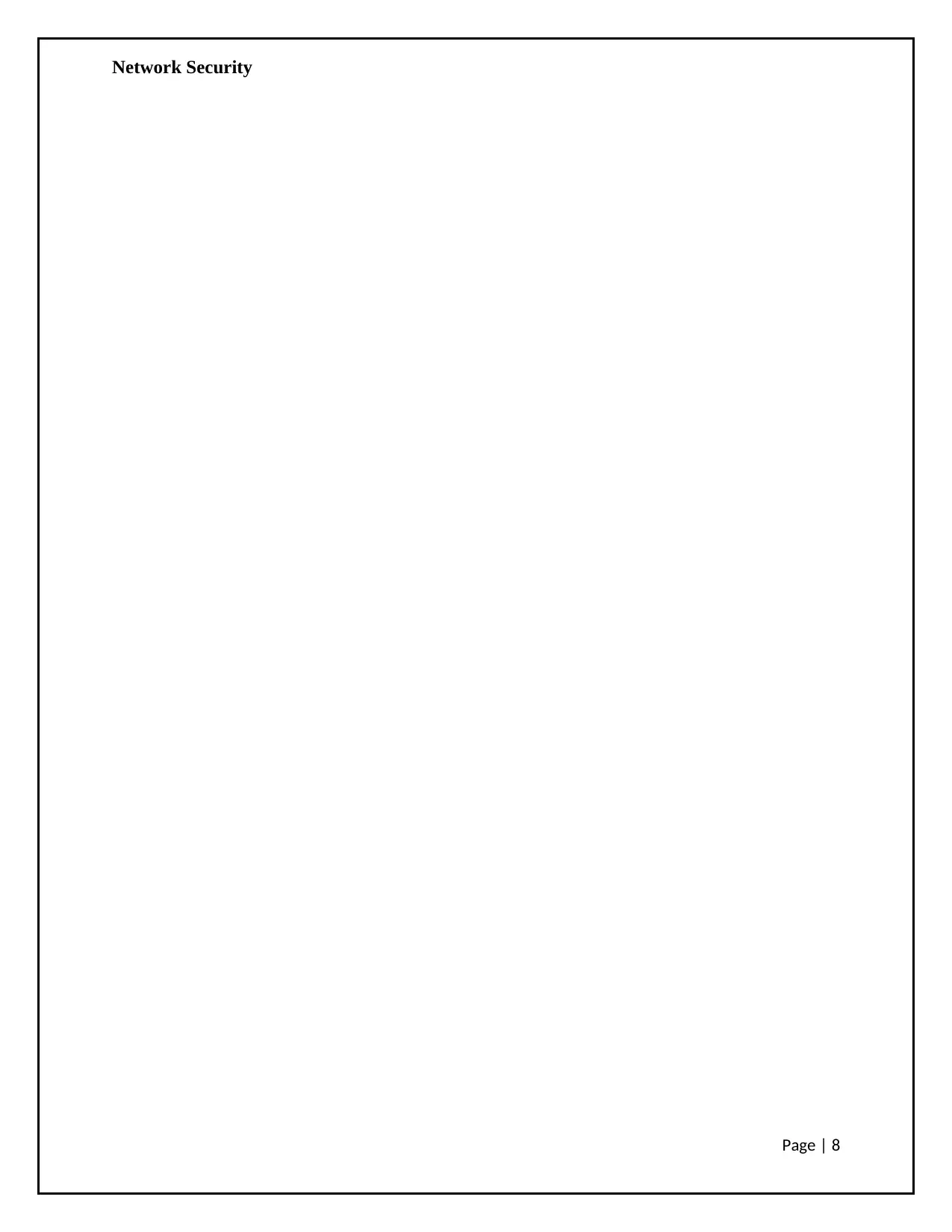
Network Security
Page | 8
Page | 8
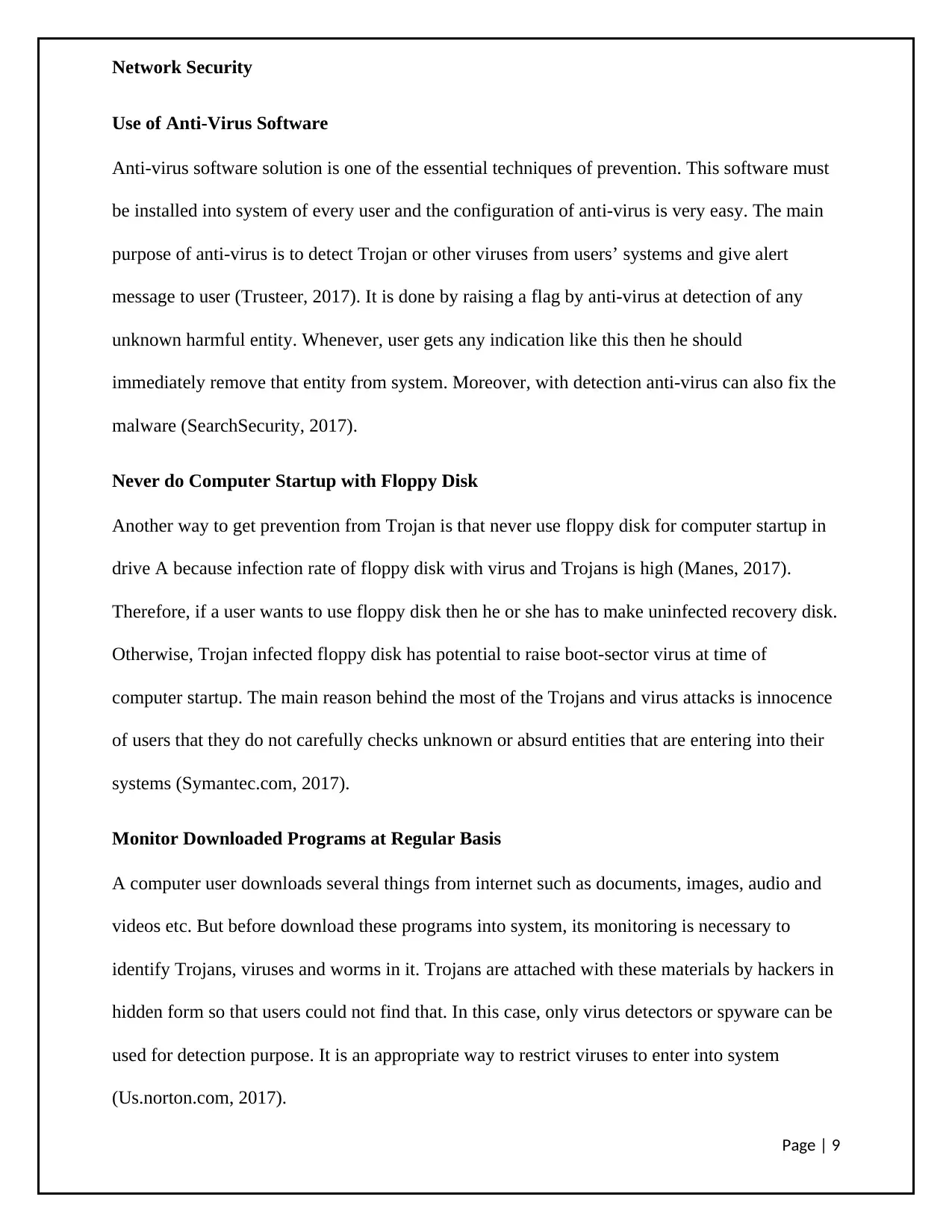
Network Security
Use of Anti-Virus Software
Anti-virus software solution is one of the essential techniques of prevention. This software must
be installed into system of every user and the configuration of anti-virus is very easy. The main
purpose of anti-virus is to detect Trojan or other viruses from users’ systems and give alert
message to user (Trusteer, 2017). It is done by raising a flag by anti-virus at detection of any
unknown harmful entity. Whenever, user gets any indication like this then he should
immediately remove that entity from system. Moreover, with detection anti-virus can also fix the
malware (SearchSecurity, 2017).
Never do Computer Startup with Floppy Disk
Another way to get prevention from Trojan is that never use floppy disk for computer startup in
drive A because infection rate of floppy disk with virus and Trojans is high (Manes, 2017).
Therefore, if a user wants to use floppy disk then he or she has to make uninfected recovery disk.
Otherwise, Trojan infected floppy disk has potential to raise boot-sector virus at time of
computer startup. The main reason behind the most of the Trojans and virus attacks is innocence
of users that they do not carefully checks unknown or absurd entities that are entering into their
systems (Symantec.com, 2017).
Monitor Downloaded Programs at Regular Basis
A computer user downloads several things from internet such as documents, images, audio and
videos etc. But before download these programs into system, its monitoring is necessary to
identify Trojans, viruses and worms in it. Trojans are attached with these materials by hackers in
hidden form so that users could not find that. In this case, only virus detectors or spyware can be
used for detection purpose. It is an appropriate way to restrict viruses to enter into system
(Us.norton.com, 2017).
Page | 9
Use of Anti-Virus Software
Anti-virus software solution is one of the essential techniques of prevention. This software must
be installed into system of every user and the configuration of anti-virus is very easy. The main
purpose of anti-virus is to detect Trojan or other viruses from users’ systems and give alert
message to user (Trusteer, 2017). It is done by raising a flag by anti-virus at detection of any
unknown harmful entity. Whenever, user gets any indication like this then he should
immediately remove that entity from system. Moreover, with detection anti-virus can also fix the
malware (SearchSecurity, 2017).
Never do Computer Startup with Floppy Disk
Another way to get prevention from Trojan is that never use floppy disk for computer startup in
drive A because infection rate of floppy disk with virus and Trojans is high (Manes, 2017).
Therefore, if a user wants to use floppy disk then he or she has to make uninfected recovery disk.
Otherwise, Trojan infected floppy disk has potential to raise boot-sector virus at time of
computer startup. The main reason behind the most of the Trojans and virus attacks is innocence
of users that they do not carefully checks unknown or absurd entities that are entering into their
systems (Symantec.com, 2017).
Monitor Downloaded Programs at Regular Basis
A computer user downloads several things from internet such as documents, images, audio and
videos etc. But before download these programs into system, its monitoring is necessary to
identify Trojans, viruses and worms in it. Trojans are attached with these materials by hackers in
hidden form so that users could not find that. In this case, only virus detectors or spyware can be
used for detection purpose. It is an appropriate way to restrict viruses to enter into system
(Us.norton.com, 2017).
Page | 9
⊘ This is a preview!⊘
Do you want full access?
Subscribe today to unlock all pages.

Trusted by 1+ million students worldwide
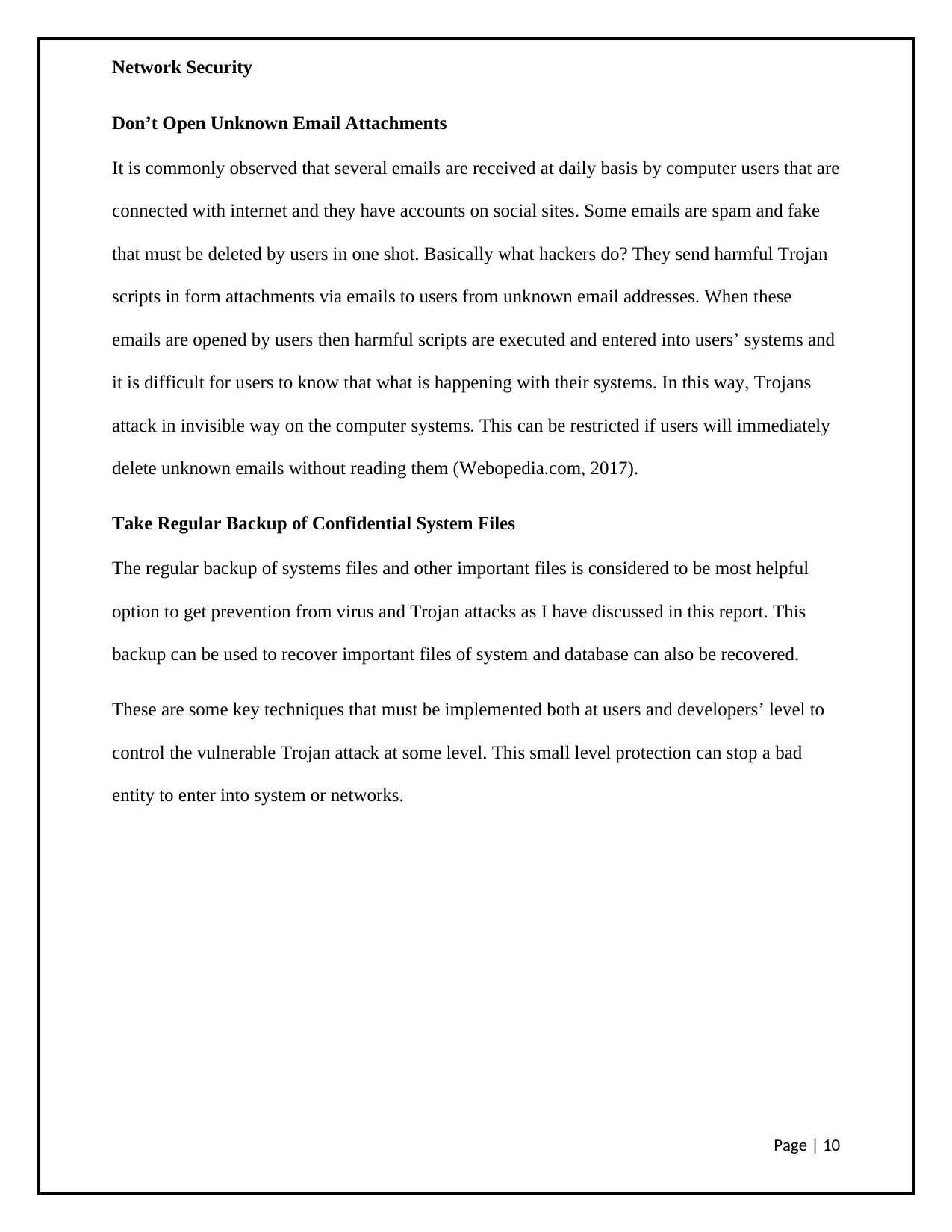
Network Security
Don’t Open Unknown Email Attachments
It is commonly observed that several emails are received at daily basis by computer users that are
connected with internet and they have accounts on social sites. Some emails are spam and fake
that must be deleted by users in one shot. Basically what hackers do? They send harmful Trojan
scripts in form attachments via emails to users from unknown email addresses. When these
emails are opened by users then harmful scripts are executed and entered into users’ systems and
it is difficult for users to know that what is happening with their systems. In this way, Trojans
attack in invisible way on the computer systems. This can be restricted if users will immediately
delete unknown emails without reading them (Webopedia.com, 2017).
Take Regular Backup of Confidential System Files
The regular backup of systems files and other important files is considered to be most helpful
option to get prevention from virus and Trojan attacks as I have discussed in this report. This
backup can be used to recover important files of system and database can also be recovered.
These are some key techniques that must be implemented both at users and developers’ level to
control the vulnerable Trojan attack at some level. This small level protection can stop a bad
entity to enter into system or networks.
Page | 10
Don’t Open Unknown Email Attachments
It is commonly observed that several emails are received at daily basis by computer users that are
connected with internet and they have accounts on social sites. Some emails are spam and fake
that must be deleted by users in one shot. Basically what hackers do? They send harmful Trojan
scripts in form attachments via emails to users from unknown email addresses. When these
emails are opened by users then harmful scripts are executed and entered into users’ systems and
it is difficult for users to know that what is happening with their systems. In this way, Trojans
attack in invisible way on the computer systems. This can be restricted if users will immediately
delete unknown emails without reading them (Webopedia.com, 2017).
Take Regular Backup of Confidential System Files
The regular backup of systems files and other important files is considered to be most helpful
option to get prevention from virus and Trojan attacks as I have discussed in this report. This
backup can be used to recover important files of system and database can also be recovered.
These are some key techniques that must be implemented both at users and developers’ level to
control the vulnerable Trojan attack at some level. This small level protection can stop a bad
entity to enter into system or networks.
Page | 10
Paraphrase This Document
Need a fresh take? Get an instant paraphrase of this document with our AI Paraphraser
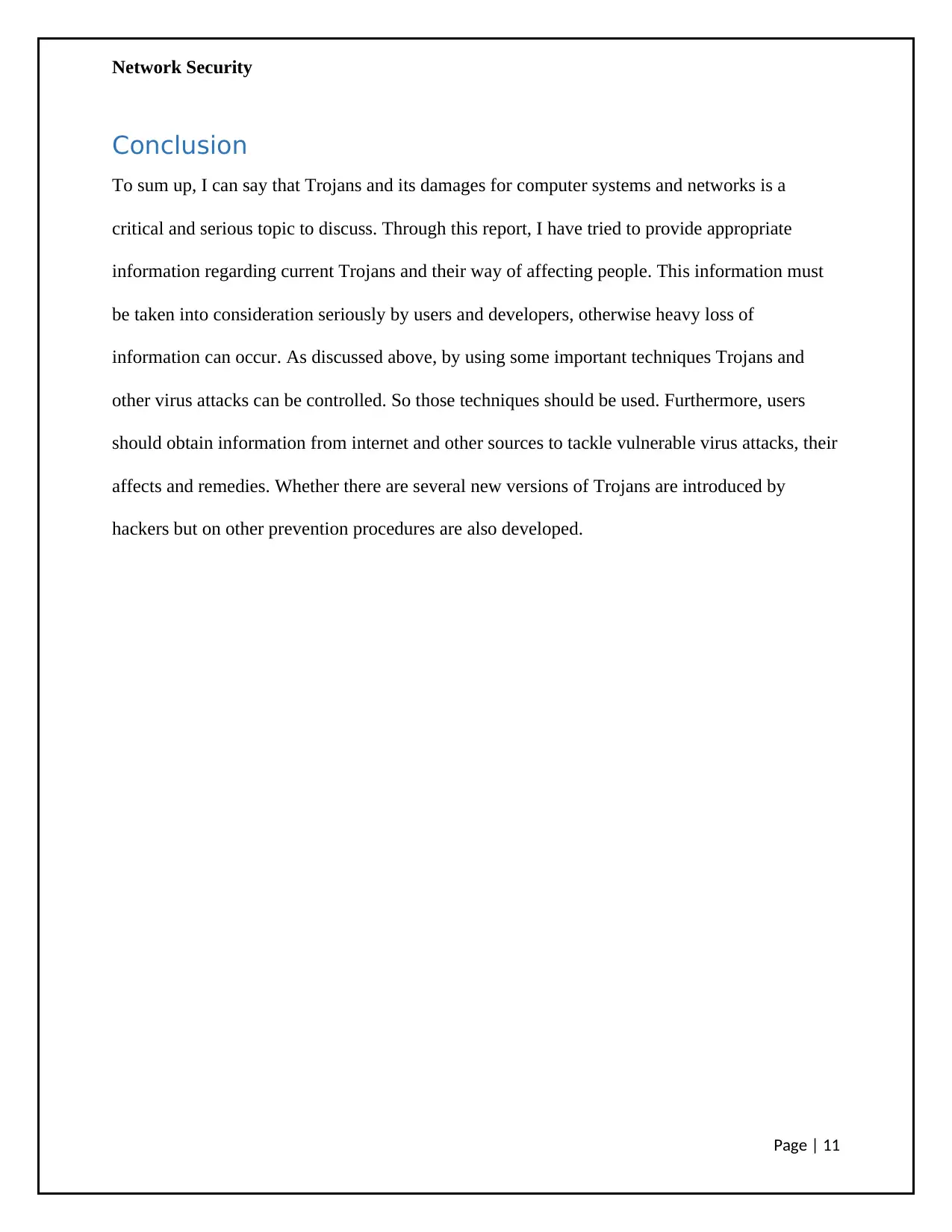
Network Security
Conclusion
To sum up, I can say that Trojans and its damages for computer systems and networks is a
critical and serious topic to discuss. Through this report, I have tried to provide appropriate
information regarding current Trojans and their way of affecting people. This information must
be taken into consideration seriously by users and developers, otherwise heavy loss of
information can occur. As discussed above, by using some important techniques Trojans and
other virus attacks can be controlled. So those techniques should be used. Furthermore, users
should obtain information from internet and other sources to tackle vulnerable virus attacks, their
affects and remedies. Whether there are several new versions of Trojans are introduced by
hackers but on other prevention procedures are also developed.
Page | 11
Conclusion
To sum up, I can say that Trojans and its damages for computer systems and networks is a
critical and serious topic to discuss. Through this report, I have tried to provide appropriate
information regarding current Trojans and their way of affecting people. This information must
be taken into consideration seriously by users and developers, otherwise heavy loss of
information can occur. As discussed above, by using some important techniques Trojans and
other virus attacks can be controlled. So those techniques should be used. Furthermore, users
should obtain information from internet and other sources to tackle vulnerable virus attacks, their
affects and remedies. Whether there are several new versions of Trojans are introduced by
hackers but on other prevention procedures are also developed.
Page | 11
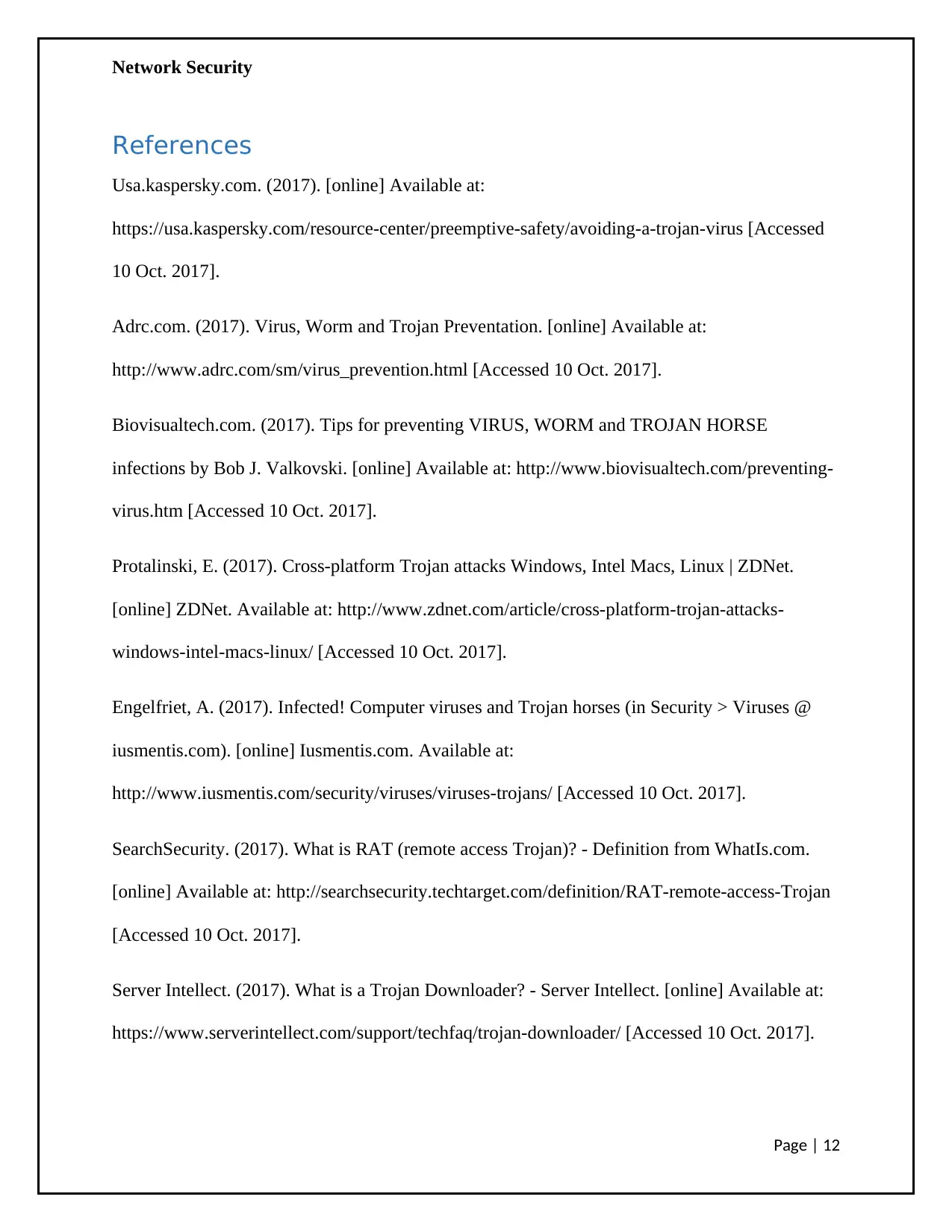
Network Security
References
Usa.kaspersky.com. (2017). [online] Available at:
https://usa.kaspersky.com/resource-center/preemptive-safety/avoiding-a-trojan-virus [Accessed
10 Oct. 2017].
Adrc.com. (2017). Virus, Worm and Trojan Preventation. [online] Available at:
http://www.adrc.com/sm/virus_prevention.html [Accessed 10 Oct. 2017].
Biovisualtech.com. (2017). Tips for preventing VIRUS, WORM and TROJAN HORSE
infections by Bob J. Valkovski. [online] Available at: http://www.biovisualtech.com/preventing-
virus.htm [Accessed 10 Oct. 2017].
Protalinski, E. (2017). Cross-platform Trojan attacks Windows, Intel Macs, Linux | ZDNet.
[online] ZDNet. Available at: http://www.zdnet.com/article/cross-platform-trojan-attacks-
windows-intel-macs-linux/ [Accessed 10 Oct. 2017].
Engelfriet, A. (2017). Infected! Computer viruses and Trojan horses (in Security > Viruses @
iusmentis.com). [online] Iusmentis.com. Available at:
http://www.iusmentis.com/security/viruses/viruses-trojans/ [Accessed 10 Oct. 2017].
SearchSecurity. (2017). What is RAT (remote access Trojan)? - Definition from WhatIs.com.
[online] Available at: http://searchsecurity.techtarget.com/definition/RAT-remote-access-Trojan
[Accessed 10 Oct. 2017].
Server Intellect. (2017). What is a Trojan Downloader? - Server Intellect. [online] Available at:
https://www.serverintellect.com/support/techfaq/trojan-downloader/ [Accessed 10 Oct. 2017].
Page | 12
References
Usa.kaspersky.com. (2017). [online] Available at:
https://usa.kaspersky.com/resource-center/preemptive-safety/avoiding-a-trojan-virus [Accessed
10 Oct. 2017].
Adrc.com. (2017). Virus, Worm and Trojan Preventation. [online] Available at:
http://www.adrc.com/sm/virus_prevention.html [Accessed 10 Oct. 2017].
Biovisualtech.com. (2017). Tips for preventing VIRUS, WORM and TROJAN HORSE
infections by Bob J. Valkovski. [online] Available at: http://www.biovisualtech.com/preventing-
virus.htm [Accessed 10 Oct. 2017].
Protalinski, E. (2017). Cross-platform Trojan attacks Windows, Intel Macs, Linux | ZDNet.
[online] ZDNet. Available at: http://www.zdnet.com/article/cross-platform-trojan-attacks-
windows-intel-macs-linux/ [Accessed 10 Oct. 2017].
Engelfriet, A. (2017). Infected! Computer viruses and Trojan horses (in Security > Viruses @
iusmentis.com). [online] Iusmentis.com. Available at:
http://www.iusmentis.com/security/viruses/viruses-trojans/ [Accessed 10 Oct. 2017].
SearchSecurity. (2017). What is RAT (remote access Trojan)? - Definition from WhatIs.com.
[online] Available at: http://searchsecurity.techtarget.com/definition/RAT-remote-access-Trojan
[Accessed 10 Oct. 2017].
Server Intellect. (2017). What is a Trojan Downloader? - Server Intellect. [online] Available at:
https://www.serverintellect.com/support/techfaq/trojan-downloader/ [Accessed 10 Oct. 2017].
Page | 12
⊘ This is a preview!⊘
Do you want full access?
Subscribe today to unlock all pages.

Trusted by 1+ million students worldwide
1 out of 15
Related Documents
Your All-in-One AI-Powered Toolkit for Academic Success.
+13062052269
info@desklib.com
Available 24*7 on WhatsApp / Email
![[object Object]](/_next/static/media/star-bottom.7253800d.svg)
Unlock your academic potential
Copyright © 2020–2026 A2Z Services. All Rights Reserved. Developed and managed by ZUCOL.





